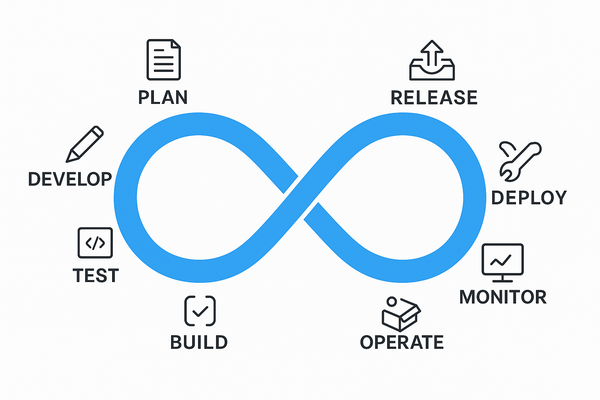Stay Relevant, In-Demand & Highly Paid in the DevOps World with DevOps Skills.
vOps is no longer a “nice-to-have.” It’s the engine behind modern software delivery.
In 2025, businesses demand faster releases, better automation, and rock-solid infrastructure—and they’re hiring skilled DevOps engineers to make it happen.
But with so many tools and technologies, where should you focus?
Here are the 7 most essential DevOps skills you need in 2025, backed by real-world examples and the latest tools that companies are actively using.
Let’s dive in.
1. Linux Mastery & Shell Scripting
Linux is the heartbeat of DevOps. Whether it’s running servers, writing scripts, or debugging errors, Linux knowledge is non-negotiable.
Why It Matters:
Most cloud servers, CI/CD tools, and containers run on Linux-based systems.
Real-World Example:
Automating daily log backups or writing a shell script to clean up unused Docker images.
What to Learn:
- Bash scripting
- crontab & automation
- File permissions, users, and processes.
- Example -Complete ping command tutorial blog
2. Cloud Platforms (AWS, Azure, GCP)
Cloud computing is the foundation of DevOps scalability. Companies are going cloud-native—and they need engineers who speak the cloud fluently.
Why It Matters:
Manual server setup is outdated. Cloud platforms like AWS offer on-demand resources, security, and flexibility.
Real-World Example:
Setting up auto-scaling groups for a web app that handles variable traffic.
What to Learn:
- AWS EC2, S3, VPC, IAM
- Azure DevOps Pipelines
- Google Cloud Kubernetes Engine (GKE)
3. CI/CD Automation
CI/CD (Continuous Integration and Continuous Delivery) turns manual deployment into a fast, automated, error-free process.
Why It Matters:
Companies want faster releases with fewer bugs. CI/CD makes it possible.
Real-World Example:
Deploying an application to production every time code is merged into the main branch—automatically.
Tools to Learn:
- GitHub Actions / GitLab CI
- Jenkins (still widely used)
- Bitbucket Pipelines
- Showcase your projects
4. Containers & Kubernetes
Containers are lightweight, portable, and perfect for modern microservices. Kubernetes orchestrates them at scale.
Why It Matters:
Containers ensure consistency across environments. Kubernetes ensures they stay alive, healthy, and scalable.
Real-World Example:
Running a Dockerized Node.js app on Kubernetes with automatic scaling and load balancing.
What to Learn:
- Docker & Docker Compose
- Kubernetes (Pods, Services, Deployments)
- Helm (Kubernetes package manager)
5. Infrastructure as Code (IaC)
IaC enables you to write and manage infrastructure like software—with version control, reusability, and speed.
Why It Matters:
Manual infrastructure setup is error-prone. IaC is faster, safer, and scalable.
Real-World Example:
Using Terraform to provision entire AWS architecture with a single command.
Tools to Learn:
- Terraform (industry standard)
- Ansible (for configuration management)
- AWS CloudFormation (native IaC)
6. Monitoring & Logging
Your infrastructure must be observable. Monitoring helps you catch issues before they explode.
Why It Matters:
Without monitoring, you’re blind to downtime, performance bottlenecks, and errors.
Real-World Example:
Setting up alerts when server CPU usage crosses 80%, or analyzing Nginx logs for traffic spikes.
Tools to Learn:
Loki + Fluentd (lightweight logging)
Prometheus + Grafana (metrics + dashboards)
ELK Stack (logs)
7. DevSecOps & Security Integration
Security is no longer optional. Integrating security into your pipeline is now an essential DevOps skill.
Why It Matters:
With increasing cloud attacks and data breaches, proactive security is expected.
Real-World Example:
Scanning Docker images for vulnerabilities before pushing them to production.
Tools to Learn:
- Trivy (Docker image scanner)
- Snyk (code & container security)
- HashiCorp Vault (secrets management)
DevOps engineers work cross-functionally with developers, testers, and managers. Communication, documentation, and collaboration are your secret weapons.
Final Tips
Want to become a highly paid, future-proof DevOps engineer?
Don’t learn everything. Master the right things.
Start with one skill from this list, and go deep.
Ready to Grow Faster?
Subscribe to my DevOps newsletter to receive:
- Weekly tutorials
- Tool breakdowns
- Career tips
- Interview questions
- and deep dives on real-world DevOps case studies.
Share This Post
Let’s grow together in 2025
Next Steps
- Follow our DevOps tutorials
- Explore more DevOps engineer career guides
- Subscribe to InsightClouds for weekly updates
- Subscribe our DevOps youtube channel
